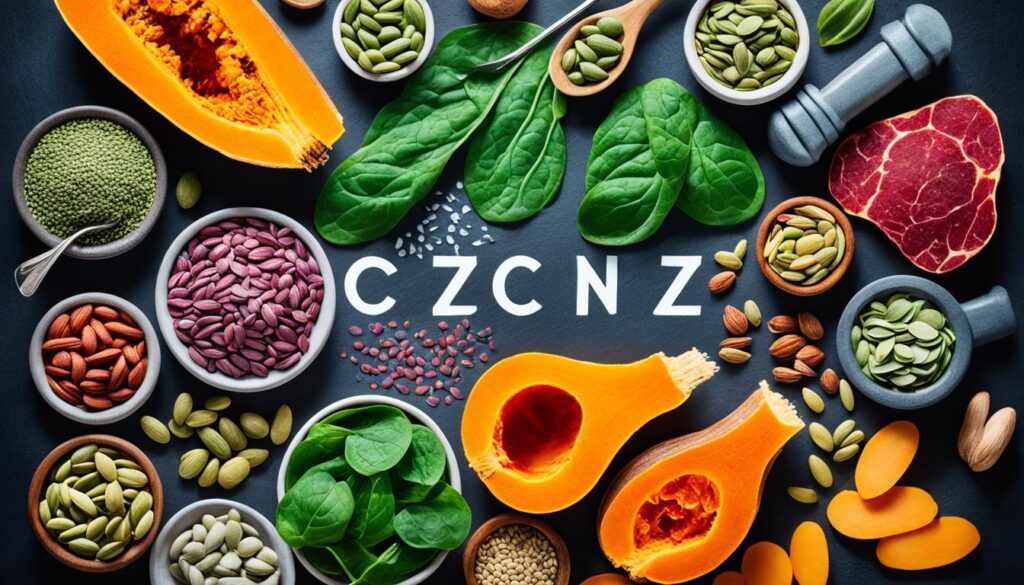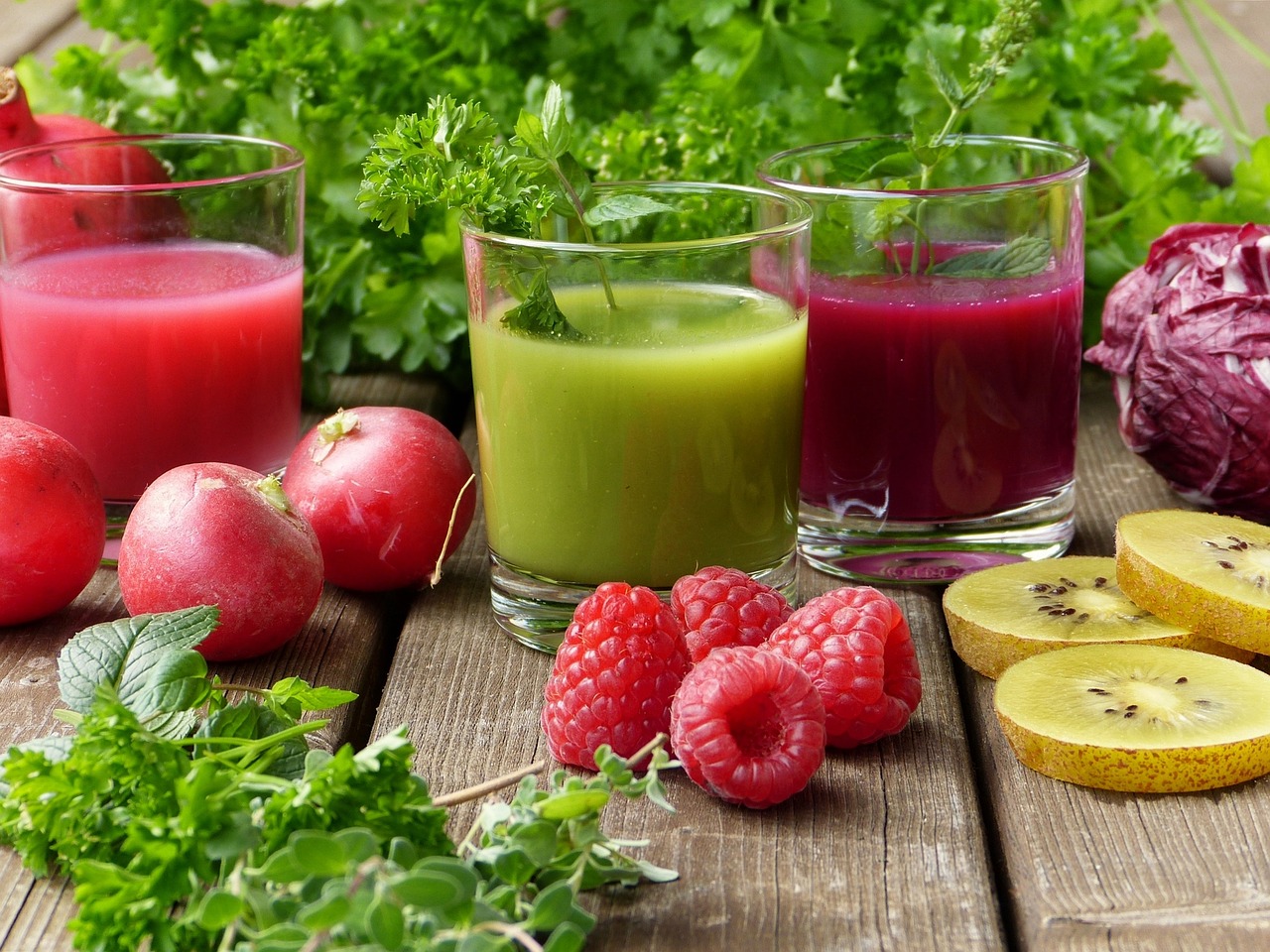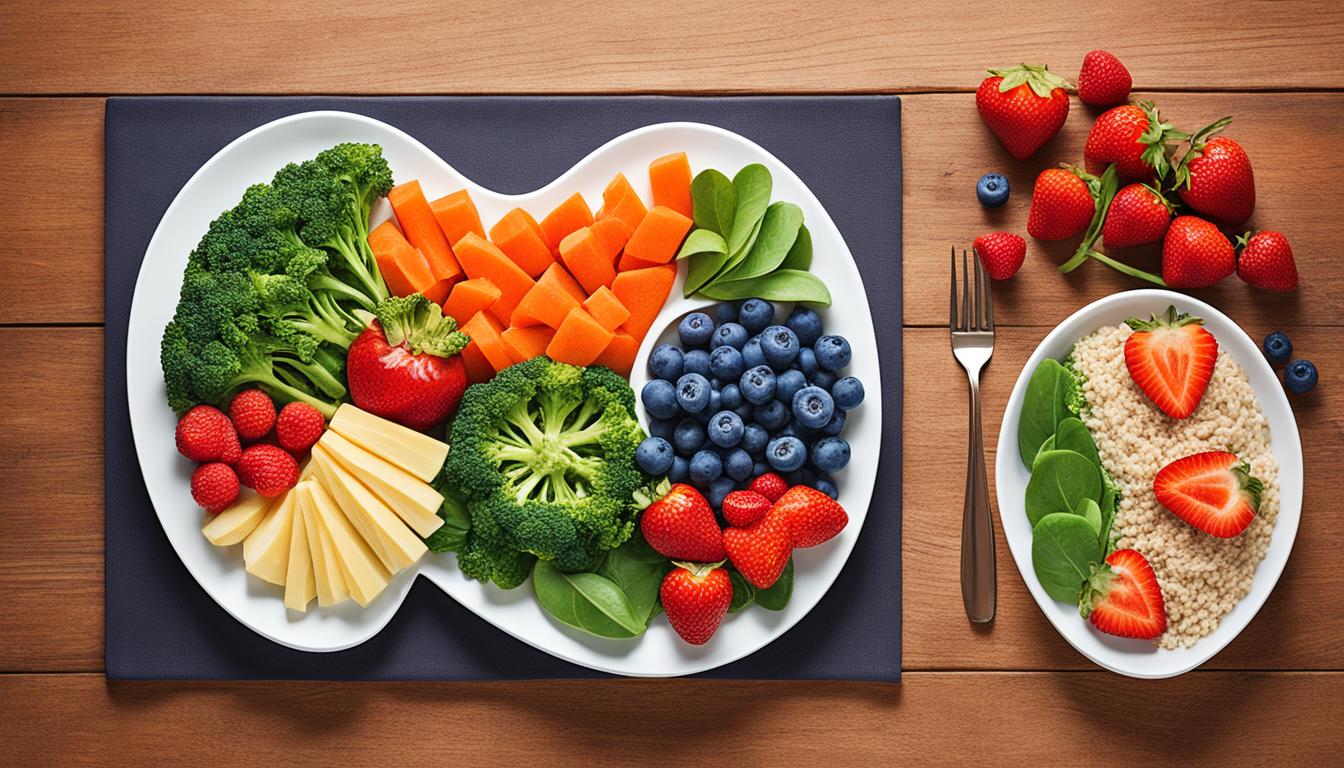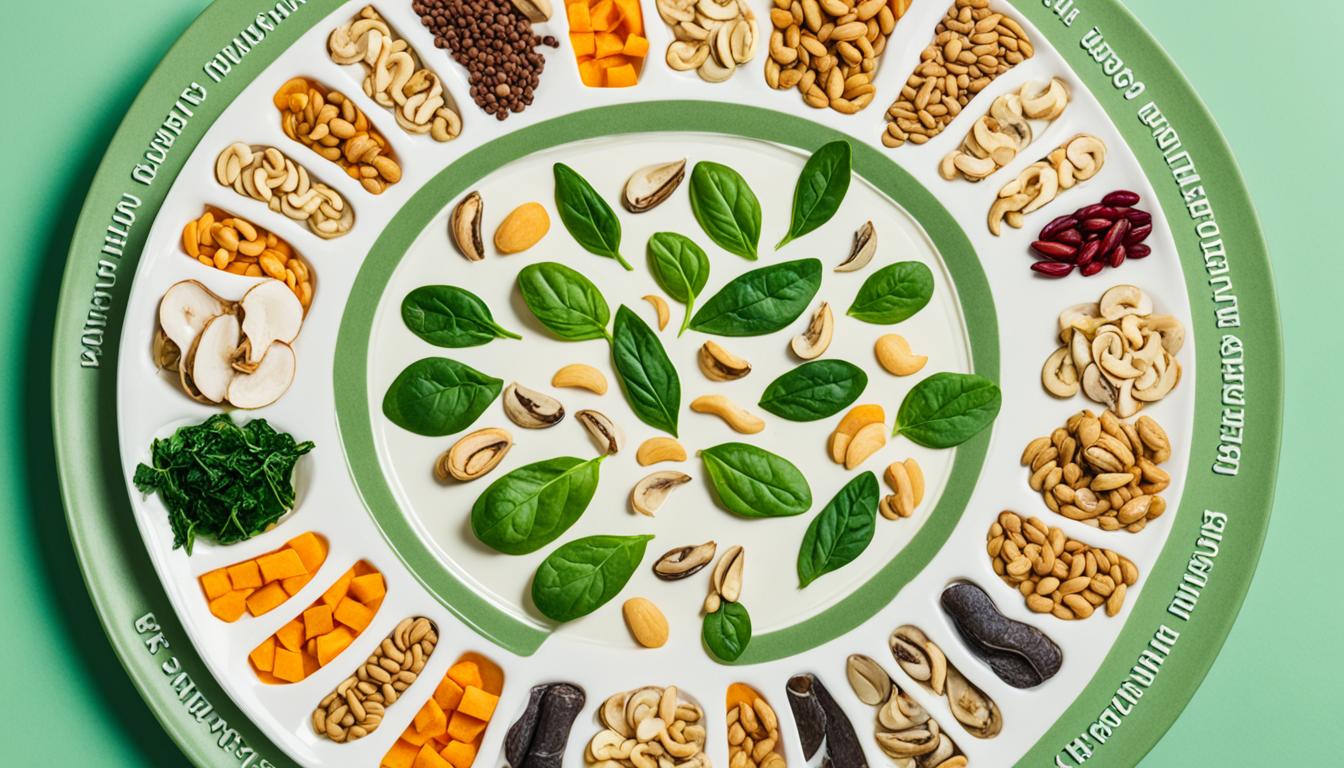7 Foods Rich with Zinc for Optimal Health
Are you getting enough zinc in your diet? This essential mineral plays a crucial role in multiple bodily functions, from immune function to wound healing and growth. But did you know that certain foods are especially rich in zinc? Discover the top 7 zinc-rich foods that can support your overall health and well-being.
Key Takeaways:
- Oysters are the richest food source of zinc, with the highest content per serving compared to any other food.
- Other animal-based sources of zinc include beef, pork, and various types of seafood.
- Incorporate plant-based sources of zinc, such as legumes, nuts, and seeds, into your diet.
- Breakfast cereals fortified with zinc are a major source of the mineral in the American diet.
- Ensure you are getting adequate zinc for optimal health and well-being by including these zinc-rich foods in your diet.
Zinc’s Role in Cellular Metabolism and Immune Function
Zinc is an essential mineral that not only supports numerous bodily functions but also plays a vital role in cellular metabolism and immune function. Let’s explore how zinc influences these two critical aspects of our health.
Cellular Metabolism:
Zinc is involved in the catalytic activity of hundreds of enzymes that drive important metabolic processes in our cells. These enzymes are responsible for breaking down nutrients and converting them into energy, facilitating the optimal functioning of our body. Without sufficient zinc, these enzymatic reactions may be compromised, leading to inefficient cellular metabolism.
Immune Function:
Zinc is a key nutrient for bolstering our immune system. It plays a crucial role in activating T cells, which are a type of white blood cells that regulate immune responses and help fight off infections. By supporting the body’s defense mechanisms, zinc enhances our ability to ward off pathogens and maintain overall immune health.
Additionally, zinc deficiency can have detrimental effects on immune function. When our bodies lack adequate zinc, we become more susceptible to infections such as colds, pneumonia, and other respiratory illnesses. Therefore, maintaining optimal zinc levels is essential for a robust and responsive immune system.
The Implications of Zinc Deficiency:
Without sufficient zinc, our bodies may experience impaired immune function, leading to an increased vulnerability to infections and a higher risk of developing colds, pneumonia, and other respiratory illnesses.
It’s important to note that while zinc supplementation can be beneficial, excessive intake can also have adverse effects. Striking the right balance and obtaining zinc from natural dietary sources is the best approach to ensuring proper cellular metabolism and immune function.
tag placement: As we can see, zinc is not only crucial for cellular metabolism but also plays a vital role in supporting a strong immune system. By maintaining adequate zinc levels through a balanced diet, we can promote optimal health and well-being.Zinc’s Role in Growth and DevelopmentZinc plays a vital role in supporting healthy growth and development during various stages of life, including pregnancy, infancy, childhood, and adolescence. It is an essential mineral that contributes to improved growth and is crucial for proper cell division.During pregnancy, zinc is particularly important for the developing fetus. It supports the formation of important structures and systems and ensures proper growth. Adequate zinc intake during pregnancy is essential to ensure optimal development and reduce the risk of complications.In children, zinc continues to play a vital role in growth and development. It supports the growth of tissues, organs, and bones and helps maintain overall health. Adequate zinc intake in childhood is crucial for proper cognitive development, immune function, and healthy growth.Did you know?
Zinc deficiency in children:
can lead to growth retardation and impaired immune function, increasing the risk of infections and other health problems.Table: Foods Rich in Zinc for Growth and DevelopmentAs demonstrated in the table above, various foods contain significant amounts of zinc, making it easy to incorporate into the diet. Oysters are the richest source of zinc, followed by animal-based foods such as beef, poultry, and eggs. Dairy products, legumes, nuts, and seeds also contribute to zinc intake.To support healthy growth and development, it is essential to ensure an adequate intake of zinc-rich foods. Including a variety of these foods in the diet can help meet the recommended daily zinc requirements, supporting optimal growth, development, and overall health.Zinc’s Benefits for Skin Health: Zinc plays a crucial role in maintaining skin health and promoting wound healing. Its involvement in cell growth, collagen formation, and inflammatory responses makes it an essential mineral for the maintenance and repair of skin tissues.

When it comes to wound healing, zinc is known to stimulate the production of new cells, supporting the regeneration process and speeding up the recovery time. It also plays a role in collagen synthesis, which is essential for maintaining the skin’s structural integrity and elasticity.In addition to wound healing, products containing zinc are commonly used in the treatment of various skin conditions. Zinc’s anti-inflammatory properties help reduce the redness and irritation associated with acne, while its antimicrobial effects can help combat infections.
“Zinc is an important nutrient for maintaining healthy skin and promoting optimal wound healing.”
Furthermore, zinc’s ability to regulate cell turnover and reduce sebum production may help alleviate the symptoms of conditions such as eczema and psoriasis, which are characterized by excessive cell growth and inflammation.Incorporating zinc-rich foods into your diet, along with topical applications of zinc-based products, can contribute to overall skin health and support the healing of wounds, ulcers, and other skin disorders.Zinc’s Impact on Eye HealthZinc plays a crucial role in maintaining optimal eye health and preventing age-related macular degeneration (AMD), a leading cause of vision loss in older adults. Studies have shown that zinc, along with other essential nutrients, can slow down the progression of AMD and reduce the risk of developing the condition.AMD affects the macula, the part of the eye responsible for sharp central vision. As the disease progresses, it can lead to blurred or distorted vision, making everyday activities challenging.A comprehensive eye-health regimen that includes zinc-rich foods and supplements can help protect against the development and progression of AMD. Zinc aids in maintaining the integrity of the macula and supports the function of retinal cells.
“Zinc is a critical nutrient for eye health, particularly in preventing and managing age-related macular degeneration. Including zinc-rich foods in your diet and considering supplements can play a significant role in preserving healthy vision.” Dr. Emily Smith, Ophthalmologist
A balanced diet that includes:
Zinc-rich foods can provide the body with the necessary nutrients to support eye health. The following table illustrates some of the top food sources of zinc:In addition to dietary sources, zinc supplements can be beneficial for individuals at high risk of AMD or those with a diagnosed deficiency. It is important to consult with a healthcare professional before starting any supplementation regimen.Zinc’s impact on eye health goes beyond AMD prevention. It also helps maintain overall eye function and supports the body’s natural defense against damage caused by environmental factors, such as ultraviolet (UV) light.By incorporating zinc into your diet and considering appropriate supplementation, you can take proactive steps to protect and preserve your eye health for years to come.Zinc’s Role in Boosting the Immune SystemZinc plays a crucial role in supporting immune health, making it an essential mineral for overall well-being. One of the key functions of zinc is its ability to activate T cells, which are responsible for regulating the immune response and defending against infections. This means that zinc helps to strengthen the body’s natural defense mechanisms, allowing it to effectively fight off harmful pathogens.Research has shown that taking zinc supplements at the onset of cold symptoms can help shorten the duration of a cold. While the impact of zinc on symptom severity is still unclear, there is evidence to suggest that zinc may have a beneficial effect on reducing the severity and duration of colds.It is important to note that intranasal zinc has been associated with a loss of smell and is not recommended. Therefore, it is best to stick to oral zinc supplements or consume zinc-rich foods to support immune health.One way to ensure an adequate intake of zinc is through a balanced diet that includes zinc-rich foods. In the next section, we will explore some of the best food sources of zinc and how they can contribute to overall health and well-being.Zinc’s Contribution to Reduced Inflammation
Zinc and inflammation:
Zinc has been found to decrease oxidative stress and reduce inflammation in the body.Chronic inflammation is associated with various health conditions, including heart disease, diabetes, and cancer.While zinc’s role in preventing these diseases is still being researched, it shows potential for reducing inflammation and oxidative stress.Zinc’s Anti-Inflammatory EffectsZinc plays a crucial role in modulating the body’s inflammatory response. It helps regulate the production and activity of cytokines, which are proteins involved in inflammation.Research suggests that zinc can inhibit the production of pro-inflammatory cytokines while promoting the production of anti-inflammatory cytokines. This balance contributes to the overall reduction of inflammation in the body.
“Zinc supplementation has been shown to reduce inflammatory markers in individuals with chronic inflammatory conditions.”
Zinc and Chronic DiseasesThe role of zinc in reducing inflammation is particularly relevant in the context of chronic diseases. Chronic inflammation is a common underlying factor in conditions such as cardiovascular disease, type 2 diabetes, and certain types of cancer.Emerging evidence suggests that zinc supplementation may have a protective effect against the development and progression of these chronic diseases by reducing inflammation.The Potential of Zinc in Combating InflammationWhile further research is needed to fully understand the mechanisms and extent of zinc’s anti-inflammatory properties, current studies show promising results.By incorporating zinc-rich foods into the diet or considering zinc supplementation under medical supervision, individuals may potentially reduce inflammation and improve their overall health. Oysters: The Richest Food Source of ZincIf you’re looking to boost your zinc intake, oysters are the way to go. These delicious mollusks are not only a culinary delicacy but also contain the highest amount of zinc per serving compared to any other food. Just a 3-ounce serving of raw oysters provides approximately 32 milligrams of zinc, which is significantly higher than other sources.Zinc, an essential mineral, plays a crucial role in multiple bodily functions, including cellular metabolism, immune function, protein and DNA synthesis, wound healing, and cell division. It also supports growth and development, making it particularly important during pregnancy, childhood, and adolescence.By incorporating oysters into your diet, you can easily increase your zinc intake and reap the numerous benefits this mineral offers. Whether you enjoy them raw, grilled, or as part of a delicious seafood dish, oysters are a fantastic choice for those looking to optimize their zinc levels.Remember, meeting daily zinc requirements is essential for optimal health, and oysters provide an excellent and flavorful way to achieve that. Check out the table below for a comparison of zinc content in different foods, including oysters.As you can see from the table, oysters outshine other foods when it comes to zinc content. So why not indulge in some mouthwatering oysters and give your body the zinc it needs for optimal health?Other Zinc-Rich Animal-Based FoodsIn addition to oysters, there are several other animal-based foods that are rich sources of zinc. These include beef, pork, and various types of seafood.A 3-ounce serving of beef provides around 3.8 milligrams of zinc, making it a great choice for individuals looking to boost their zinc intake. Similarly, pork chops contain approximately 1.9 milligrams of zinc per 3-ounce serving.Seafood, such as crab, sardines, and shrimp, also contributes to zinc intake. Not only are these options delicious, but they offer a range of health benefits due to their high zinc content.By incorporating these zinc-rich animal-based foods into your diet, you can easily meet your daily zinc requirements and support your overall health and well-being.Plant-Based Sources of ZincWhile animal-based foods are the most abundant sources of zinc, plant-based foods also contain varying amounts of this essential mineral. Incorporating legumes, nuts, and seeds into your diet can help meet your zinc requirements, especially for vegetarians and vegans.Zinc in legumes: legumes, such as chickpeas and kidney beans, are excellent plant-based sources of zinc. These versatile legumes are not only rich in protein and fiber, but they also contribute significant amounts of zinc to your diet.
Oysters: The Richest Food Source of ZincIf you’re looking to boost your zinc intake, oysters are the way to go. These delicious mollusks are not only a culinary delicacy but also contain the highest amount of zinc per serving compared to any other food. Just a 3-ounce serving of raw oysters provides approximately 32 milligrams of zinc, which is significantly higher than other sources.Zinc, an essential mineral, plays a crucial role in multiple bodily functions, including cellular metabolism, immune function, protein and DNA synthesis, wound healing, and cell division. It also supports growth and development, making it particularly important during pregnancy, childhood, and adolescence.By incorporating oysters into your diet, you can easily increase your zinc intake and reap the numerous benefits this mineral offers. Whether you enjoy them raw, grilled, or as part of a delicious seafood dish, oysters are a fantastic choice for those looking to optimize their zinc levels.Remember, meeting daily zinc requirements is essential for optimal health, and oysters provide an excellent and flavorful way to achieve that. Check out the table below for a comparison of zinc content in different foods, including oysters.As you can see from the table, oysters outshine other foods when it comes to zinc content. So why not indulge in some mouthwatering oysters and give your body the zinc it needs for optimal health?Other Zinc-Rich Animal-Based FoodsIn addition to oysters, there are several other animal-based foods that are rich sources of zinc. These include beef, pork, and various types of seafood.A 3-ounce serving of beef provides around 3.8 milligrams of zinc, making it a great choice for individuals looking to boost their zinc intake. Similarly, pork chops contain approximately 1.9 milligrams of zinc per 3-ounce serving.Seafood, such as crab, sardines, and shrimp, also contributes to zinc intake. Not only are these options delicious, but they offer a range of health benefits due to their high zinc content.By incorporating these zinc-rich animal-based foods into your diet, you can easily meet your daily zinc requirements and support your overall health and well-being.Plant-Based Sources of ZincWhile animal-based foods are the most abundant sources of zinc, plant-based foods also contain varying amounts of this essential mineral. Incorporating legumes, nuts, and seeds into your diet can help meet your zinc requirements, especially for vegetarians and vegans.Zinc in legumes: legumes, such as chickpeas and kidney beans, are excellent plant-based sources of zinc. These versatile legumes are not only rich in protein and fiber, but they also contribute significant amounts of zinc to your diet.
- Chickpeas: Known for their role in hummus and falafel, chickpeas contain about 1.3 milligrams of zinc per cup (164 grams).
- Kidney Beans: These hearty beans provide approximately 0.9 milligrams of zinc per cup (177 grams).
Zinc in Nuts and SeedsNuts and seeds are not only delicious and nutritious but also serve as great sources of zinc. They can be enjoyed as a snack, added to salads, or incorporated into various recipes.
- Cashews: These creamy nuts provide about 1.6 milligrams of zinc per ounce (28 grams).
- Pumpkin Seeds: You can find approximately 2.2 milligrams of zinc in just one ounce (28 grams) of pumpkin seeds.
- Hemp Seeds: Highly regarded for their nutritional profile, hemp seeds contain around 2.8 milligrams of zinc per ounce (28 grams).
By including legumes, nuts, and seeds in your diet, you can enjoy the health benefits of zinc while following a plant-based lifestyle.Zinc-Fortified Breakfast Cereals and Other Zinc SourcesBreakfast cereals fortified with zinc are a major source of the mineral in the American diet. These cereals often contain 25% of the recommended daily value of zinc per serving. Dairy products, such as cheddar cheese and milk, also contribute to zinc intake. While fruits and vegetables contain very little zinc, they offer other important nutrients for overall health.Zinc-Fortified Breakfast CerealsZinc-fortified breakfast cereals provide a convenient and tasty way to increase your zinc intake. These cereals are often enriched with essential vitamins and minerals, including zinc. Consuming a bowl of zinc-fortified cereal in the morning can help you meet your daily zinc requirements and start your day with a healthy boost. Check the nutrition labels to find cereals that are fortified with zinc.Zinc in Dairy ProductsDairy products are not only a good source of calcium but also contribute to your daily zinc intake. Cheddar cheese and milk are particularly notable for their zinc content. Including dairy products in your diet can help ensure you are getting sufficient amounts of zinc along with other essential nutrients. Aim for low-fat or non-fat dairy options to keep your overall calorie and fat intake in check.While breakfast cereals and dairy products are excellent sources of zinc, it’s important to note that other food sources, such as meat, seafood, legumes, nuts, and seeds, also contribute to your zinc intake. By incorporating a variety of zinc-rich foods into your meals and snacks, you can ensure that you are meeting your daily zinc requirements for optimal health and well-being.Note: The zinc content may vary slightly depending on product brands and specific serving sizes.Include these zinc-rich foods in your diet to support your overall health, immune function, and cellular metabolism. By ensuring adequate zinc intake, you can promote optimal growth, development, and well-being.ConclusionIn conclusion, zinc is an essential mineral that plays a crucial role in maintaining optimal health. By incorporating zinc-rich foods into your diet, you can ensure that you meet your daily zinc requirements and support various bodily functions.Oysters, beef, pork, seafood, legumes, nuts, seeds, and breakfast cereals are all excellent sources of zinc. Oysters, in particular, contain the highest amount of zinc compared to any other food, making them a great choice for boosting your zinc intake.Whether you prefer animal-based or plant-based foods, there are plenty of options available to meet your zinc needs. Including these foods in your diet can help support immune function, promote healthy growth and development, enhance skin health, protect eye health, and reduce inflammation.So, make sure to incorporate zinc-rich foods into your daily meals to ensure you are reaping the many benefits that zinc has to offer. Remember, a well-balanced diet with a variety of zinc sources is key to maintaining optimal health and well-being.
FAQ
What is the role of zinc in cellular metabolism and immune function?
Zinc is essential for cellular metabolism and plays a crucial role in enhancing immune function. It activates T cells and supports the body’s defense against infections. Zinc deficiency can lead to impaired immune function and an increased risk of infection.
How does zinc contribute to growth and development?
Zinc is necessary for healthy growth and development during pregnancy, infancy, childhood, and adolescence. It supports improved growth and plays a crucial role in cell division, ensuring proper development and growth in children.
What are the benefits of zinc for skin health?
Zinc is essential for skin health and wound healing. It contributes to cell growth, collagen formation, and inflammatory responses, making it crucial for proper wound healing. Products containing zinc are commonly used to treat various skin conditions.
How does zinc impact eye health?
Zinc has been found to slow down the progression of age-related macular degeneration (AMD), an eye disease that can lead to vision loss. Supplements containing zinc, along with other nutrients, can reduce the risk of developing AMD and slow down its progression.
How does zinc boost the immune system?
Zinc plays a crucial role in supporting immune health. It helps activate T cells, which regulate the immune response and defend against infections. Taking zinc supplements at the onset of cold symptoms has been found to shorten the duration of a cold.
What is the impact of zinc on reducing inflammation?
Zinc has been found to decrease oxidative stress and reduce inflammation in the body. While more research is needed on its preventive role in chronic diseases, zinc shows potential for reducing inflammation and oxidative stress.
Which food contains the highest amount of zinc?
Oysters contain the highest amount of zinc per serving compared to any other food. A 3-ounce serving of raw oysters provides approximately 32 milligrams of zinc.
What are other animal-based foods rich in zinc?
Besides oysters, other animal-based foods rich in zinc include beef, pork, and various types of seafood.
What are some plant-based sources of zinc?
Legumes such as chickpeas and kidney beans, as well as nuts and seeds like cashews, pumpkin seeds, and hemp seeds, are good sources of zinc for vegetarians and vegans.
What are some other sources of zinc in the diet?
Breakfast cereals fortified with zinc are a major source of the mineral in the American diet. Dairy products, such as cheddar cheese and milk, also contribute to zinc intake.
How can I ensure I am getting enough zinc in my diet?
Incorporating foods such as oysters, beef, pork, seafood, legumes, nuts, seeds, and breakfast cereals into your diet can help meet your daily zinc requirements.
What are the key takeaways about zinc-rich foods?
Zinc is an essential mineral for optimal health. Oysters, beef, pork, seafood, legumes, nuts, seeds, and breakfast cereals are excellent sources of zinc that can contribute to overall well-being.
| Zinc Metabolism | Immune Function | |
|---|---|---|
| Zinc is involved in the catalytic activity of enzymes that drive cellular metabolism. | Zinc activates T cells to enhance immune responses and protect against infections. | |
| Zinc deficiency can lead to impaired metabolic reactions and inefficient energy production. | Insufficient zinc levels can compromise immune function and increase the risk of respiratory infections. | |
| Food | Zinc Content per Serving (mg) | |
| Oysters | 32 | |
| Beef | 3.8 | |
| Pork | 1.9 | |
| Poultry | 2.3 | |
| Eggs | 1.2 | |
| Dairy products | 0.4-1.2 | |
| Legumes (e.g., beans, lentils) | 0.6-1.4 | |
| Nuts and seeds (e.g., almonds, pumpkin seeds) | 0.5-8.8 | |
| Food Source | Zinc Content per 100g | |
| Oysters | 78.6mg | |
| Beef | 12.3mg | |
| Chicken | 2.7mg | |
| Pumpkin seeds | 7.6mg | |
| Chickpeas | 2.5mg | |
| Chronic Disease | Beneficial Effects of Zinc | |
| Cardiovascular disease | Reduced inflammation in blood vessels and improved endothelial function | |
| Type 2 diabetes | Better glycemic control and reduced insulin resistance | |
| Certain types of cancer | Inhibited tumor growth and reduced inflammation within tumors | |
| Food | Serving Size | Zinc Content |
| Oysters (raw) | 3 ounces | 32 milligrams |
| Beef | 3 ounces | 3.8 milligrams |
| Pork Chops | 3 ounces | 1.9 milligrams |
| Crab | 3 ounces | 4.7 milligrams |
| Sardines | 3 ounces | 0.8 milligrams |
| Food Source | Zinc Content per Serving | |
| Zinc-Fortified Breakfast Cereals | 25% of recommended daily value per serving | |
| Cheddar Cheese (1 ounce) | 1.2 milligrams of zinc | |
| Milk (1 cup) | 0.9 milligrams of zinc |









